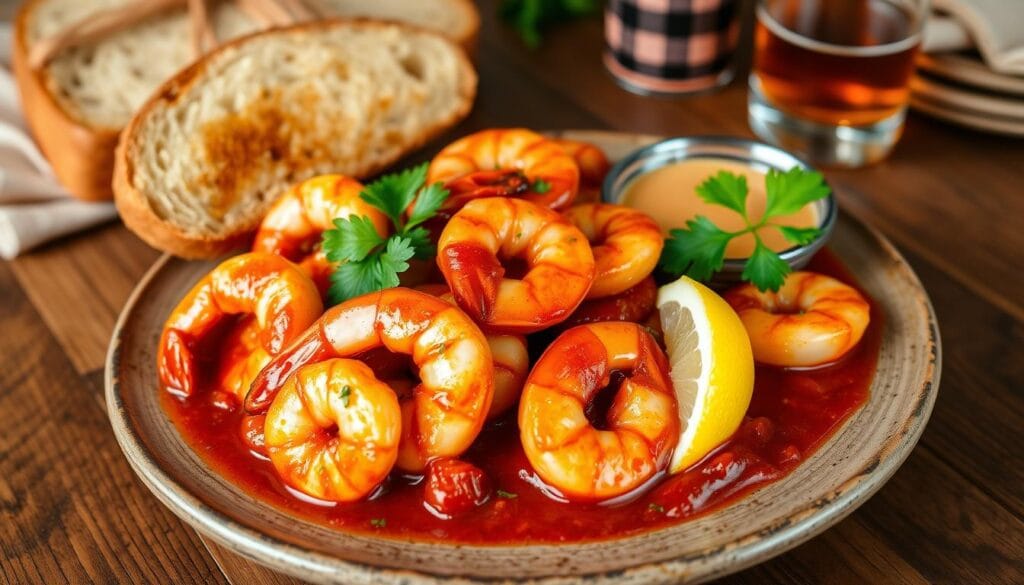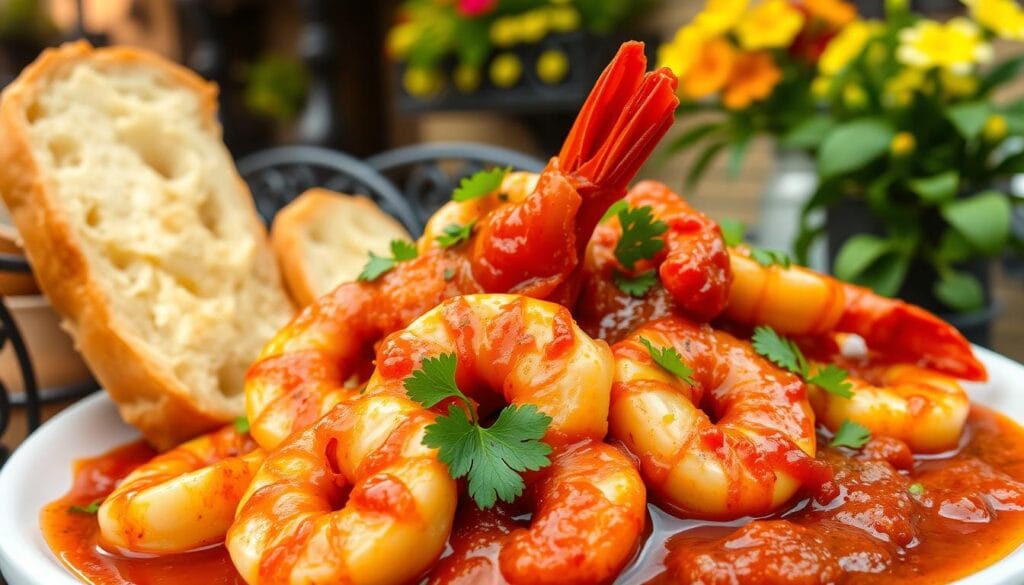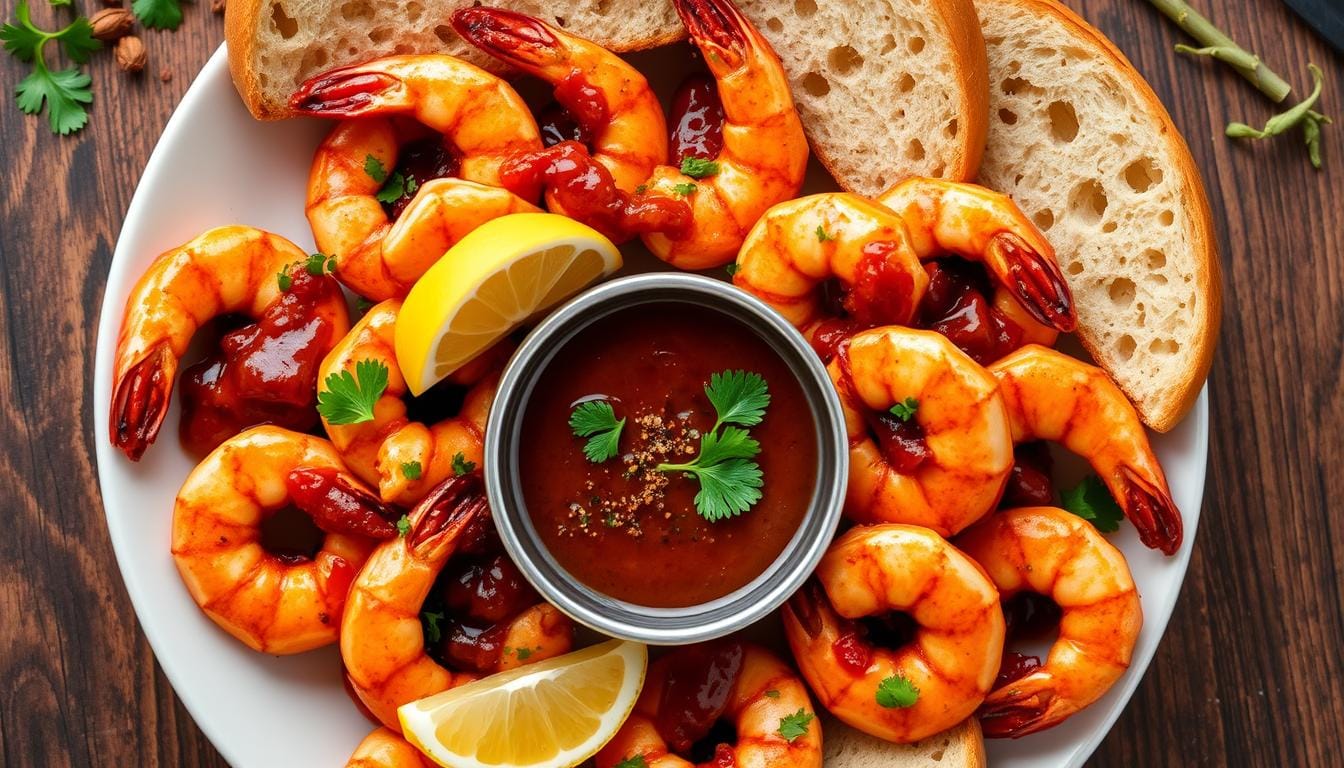How to Best Make New Orleans BBQ Shrimp: A Step-by-Step Guide
Growing up in Louisiana, the smell of spicy, buttery shrimp was always welcome. New Orleans BBQ shrimp holds a special place in my heart. It reminds me of family gatherings and the city’s rich culinary traditions. Now, I’m excited to share how to make this dish in your kitchen.
What is New Orleans BBQ Shrimp?
The History and Origin of the Dish
New Orleans Barbecue shrimp is a favorite dish from Louisiana. It’s sautéed shrimp cooked in a butter sauce with garlic and Worcestershire. This tasty seafood dish was first served in 1953 at Pascal Manale’s, a famous Creole-Italian restaurant in New Orleans.
The chef at Pascal Manale’s says the secret is using wild Louisiana shrimp with their heads on. The heads have most of the fat, which makes the dish flavorful. The shrimp are served with the shell on, then peeled at the table for a rich, messy experience.
Over time, Cajun cuisine and Creole cuisine have mixed to create this unique dish. It’s now a key part of New Orleans cuisine. People all over the United States love this seafood dish.
| Ingredient | Quantity |
|---|---|
| Paprika | 1 teaspoon |
| Ancho chile powder | 1 teaspoon |
| Ground cumin | 1 teaspoon |
| Sugar | 1 teaspoon |
| Salt | 3/4 teaspoon |
| Extra-large or jumbo shrimp | 2 pounds |
| Unsalted butter | 6 tablespoons |
| Garlic, minced | 3 large cloves |
| Worcestershire sauce | 2 tablespoons |
| Fresh lemon juice | 2 tablespoons |
| Water | 2 tablespoons |
| Scallions, dark green parts, thinly sliced | 3 |
Ingredients for Authentic New Orleans BBQ Shrimp
To make the classic New Orleans Barbecue shrimp, you need a few key ingredients. Start with large or jumbo shrimp, with the shell on for more flavor. You’ll also need a lot of butter, which is the base of the sauce.
You’ll also need Cajun seasoning, Worcestershire sauce, lemon juice, and minced garlic. The Cajun seasoning gives the dish its unique spice. The Worcestershire sauce and lemon juice add savory and tart flavors. The garlic adds depth and aroma to the sauce.
Adding a splash of beer or white wine to the sauce can also enhance the flavors. With these ingredients, you can make authentic New Orleans Barbecue shrimp at home.
| Ingredient | Quantity |
|---|---|
| Jumbo Shrimp, shell-on | 1 lb (16-20 count per pound) |
| Butter | 1/2 cup (8 tbsp + 3 tbsp) |
| Cajun Seasoning | 2 tbsp |
| Worcestershire Sauce | 1/2 cup |
| Lemon Juice | 1/2 lemon |
| Garlic, minced | 2 tbsp |
| Beer or White Wine (optional) | 1/4 cup |
With these ingredients, you can make a delicious New Orleans Barbecue shrimp dish. It will take you straight to the heart of the Big Easy.
Step-by-Step Instructions for Making New Orleans Barbecue Shrimp
Preparing the Shrimp
Begin by peeling and deveining the shrimp. This ensures they cook evenly and soak up the Cajun butter sauce better. Mix the shrimp with paprika, ancho chili powder, cumin, salt, and sugar to coat them well.
Creating the Cajun Butter Sauce
Melt salted butter in a skillet over medium heat. Add minced garlic and cook until it smells great. Then, mix in Worcestershire sauce, lemon juice, and a bit of water to make the Cajun butter sauce.
Cooking the Shrimp
Put the seasoned shrimp in the skillet with the sauce. Cook, stirring now and then, until they’re almost done. Keep simmering until the shrimp are tender and the sauce thickens a bit. Top with sliced scallions before serving.
This New Orleans Barbecueshrimp recipe is quick, ready in under 30 minutes. It’s perfect for a fast weeknight dinner. The dish offers rich, buttery, and spicy flavors, a true taste of Louisiana.
Serving and Eating New Orleans Barbecue Shrimp
Serving New Orleans Barbecue shrimp is a true culinary experience. The dish is presented in the skillet, with the shrimp still in their shells. This lets diners enjoy the full flavor and texture. The rich, buttery sauce is the star, begging to be soaked up with crusty French bread.
The traditional way to enjoy New Orleans Barbecue shrimp is by peeling and eating the shrimp with your fingers. As you peel each shrimp, you’ll feel the delightful sensation of sucking the flavorful sauce off the shells. This hands-on approach encourages guests to slow down, savor each bite, and fully immerse themselves in the dining experience.
For a visually stunning shrimp presentation, arrange the shrimp in the skillet. Let the tails curl up and around the edges. Serve the skillet directly to the table, with crusty bread and napkins for easy cleanup. Encourage your guests to dive in and enjoy the serving new orleans Barbecue shrimp in the authentic New Orleans style.
“The true essence of New Orleans Barbecue shrimp lies in the unapologetic, messy delight of peeling and savoring each succulent morsel.”

Tips for Perfectly Cooked Shrimp
When making New Orleans Barbecue shrimp, getting the texture and doneness right is crucial. Here are some tips to help your shrimp turn out perfectly cooked every time:
- Avoid Overcooking: Overcooked shrimp can become tough and rubbery. Cook them over medium heat until they’re almost done but still slightly opaque.
- Steer Clear of High Heat: Cooking the shrimp over high heat can cause them to seize up and become chewy. Stick to medium heat for best results.
- Choose the Right Size: Large or jumbo-sized shrimp work best for New Orleans Barbecue shrimp. The larger size helps prevent shrimp from becoming overcooked and tough.
By following these simple tips, you’ll be on your way to making the perfectly cooked shrimp that are a hallmark of New Orleans Barbecue shrimp. You’ll get tender, juicy, and full of Cajun flavor – the ultimate goal.
“The secret to perfectly cooked shrimp is all in the timing and temperature. Follow these tips, and you’ll have succulent, flavor-packed shrimp every time.”
Variations and Customizations
The classic New Orleans Barbecue shrimp recipe is a hit, but you can make it your own. Want it spicier or milder? This dish is perfect for trying new things and making it your own.
Spicier or Milder Versions
For a spicier version of New Orleans Barbecue shrimp, add more Cajun seasoning or crushed red pepper flakes. This adds a fiery kick that spice lovers will enjoy.
If you prefer it milder, use less Cajun seasoning or try Creole seasoning blend. This gives a balanced flavor that stays true to New Orleans’ taste.
Adding Additional Seafood
Want to make your New Orleans Barbecue shrimp even richer? Add mussels, crawfish, or lobster to the mix. It turns into a seafood feast. You can mix and match to create your dream dish.

This recipe is all about trying new things. Experiment with flavors to find what you love. Enjoy your culinary adventure!
new orleans bbq shrimp
New Orleans BBQ shrimp is a favorite Creole-Cajun dish. It’s a true taste of the Big Easy. This dish doesn’t use traditional barbecue methods. Instead, it features large, juicy new orleans Barbecue shrimp in a rich, buttery sauce. The sauce is flavored with Cajun spices, Worcestershire sauce, garlic, and lemon.
This louisiana shrimp dish comes from New Orleans’ vibrant culinary scene. It’s a signature item on menus across the city and beyond. The mix of succulent cajun shrimp and flavorful sauce takes you straight to the French Quarter.
The secret to authentic creole shrimp is the spice balance and the quality of the barbecue shrimp. It’s served with crusty French bread. This lets you soak up every last drop of the sauce. Whether you’re a local or visiting, this dish is a must-try for seafood lovers.
“New Orleans Barbecue shrimp is a symphony of flavors, a perfect blend of Creole and Cajun influences that captures the essence of the city’s vibrant culinary scene.”
From the first bite, you’ll feel like you’re in New Orleans. The dish’s aromas fill the air, inviting you to try a true taste of Louisiana.
Recommended Side Dishes
When you serve New Orleans-style BBQ shrimp, you want sides that soak up the butter sauce. There are many tasty options that go well with the shrimp’s bold flavors. These include classic starches and fresh, crunchy sides.
Buttered rice is a top choice for New Orleans Barbecueshrimp. Its fluffy texture is perfect for mopping up the Cajun-spiced sauce. Creamy grits also pair well, offering a comforting contrast to the shrimp.
Crusty French bread is a must for a heartier option. Tear it into chunks to soak up the buttery goodness. A fresh green salad or tangy coleslaw can also add a refreshing touch, balancing the richness of the New Orleans Barbecue-shrimp.
Choosing the right sides is key to enjoying this Crescent City classic. With the right pairings, your New Orleans Barbecue-shrimp dinner will be a hit.
Storing and Reheating Leftovers
Storing and reheating your New Orleans Barbecue shrimp leftovers is easy. Keep any leftover new orleans Barbecue shrimp in an airtight container in the fridge for up to 2 days. But, note that the shrimp might get a bit rubbery if frozen and then reheated.
To get the best taste, gently reheat the new orleans Barbecue-shrimp on the stovetop or in the oven. Make sure they’re just warm, without overcooking. This keeps the shrimp juicy and the new orleans bbq sauce rich.
When reheating new orleans Barbecue-shrimp, add a bit of butter or cooking liquid to the pan or oven. This helps keep the shrimp moist and flavorful. Remember, gentle reheating is key to keeping the shrimp delicious.
| Nutritional Information (per serving) | Value |
|---|---|
| Total Calories | 222.32 kcal |
| Total Fat | 15.66 g |
| Saturated Fat | 9.45 g |
| Trans Fat | 0.60 g |
| Monounsaturated Fat | 3.95 g |
| Polyunsaturated Fat | 0.90 g |
| Total Carbohydrates | 4.72 g |
| Fiber | 0.47 g |
| Sugar | 1.17 g |
| Protein | 15.88 g |
| Cholesterol | 181.04 mg |
| Sodium | 728.53 mg |
| Calcium | 89.49 mg |
| Potassium | 236.40 mg |
| Iron | 1.15 mg |
| Vitamin A | 190.65 µg |
| Vitamin C | 8.62 mg |
By following these tips, your leftover new orleans Barbecue-shrimp will stay delicious. Enjoy this tasty dish even after the first meal.
Conclusion
New Orleans Barbecue-shrimp is a true gem of Louisiana‘s Creole-Cajun cuisine. This guide helps you make the dish’s rich, buttery, and spicy flavors at home. It’s perfect as an appetizer or main course, sure to wow your guests.
The dish combines juicy shrimp with a mouthwatering butter shrimp sauce. It’s a highlight of Cajun cuisine. This recipe, starting from Pascal’s Manale in the 1950s, is a beloved part of Louisiana‘s culinary scene.
With the right techniques and ingredients, you can enjoy New Orleans Barbecue-shrimp at home. It’s a way to taste the city’s rich culture. Whether for a party or a seafood craving, this guide makes it easy to create a delicious new orleans Barbecueshrimp dish at home.

